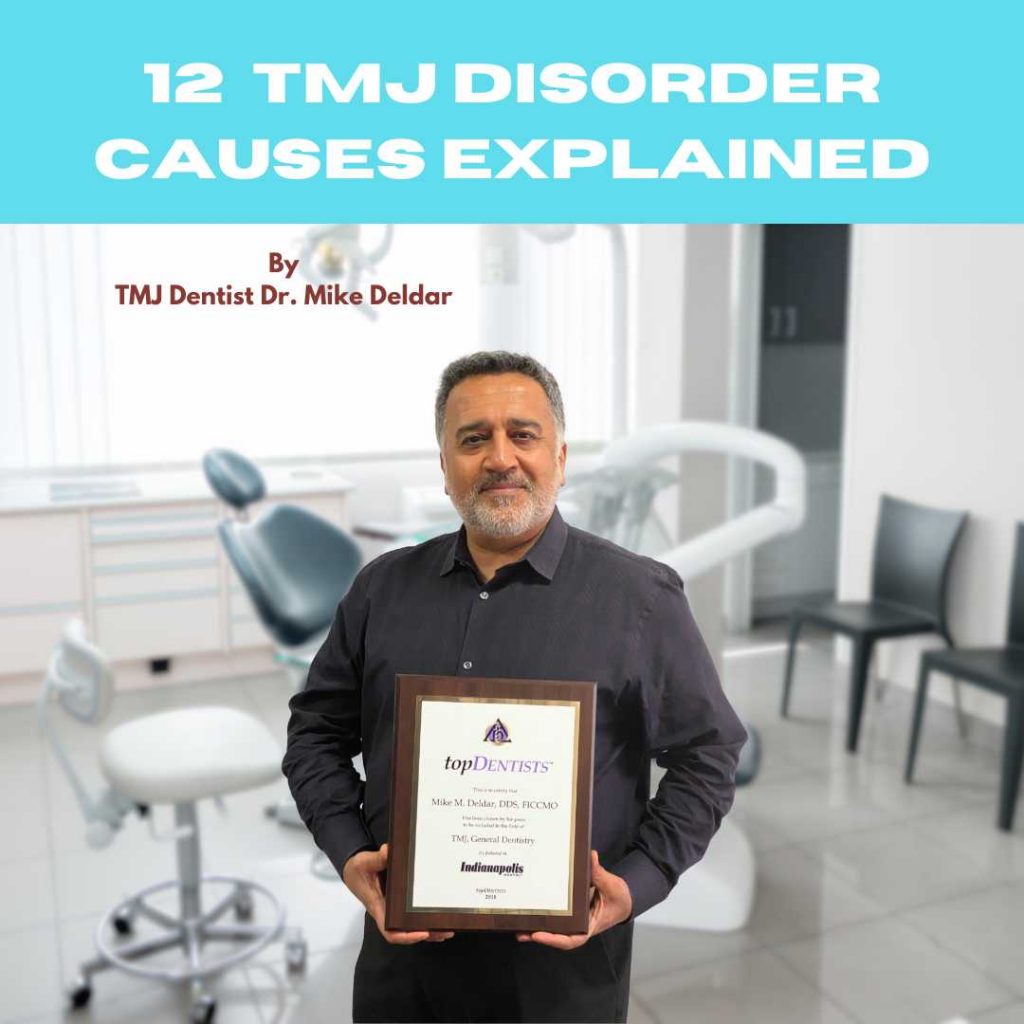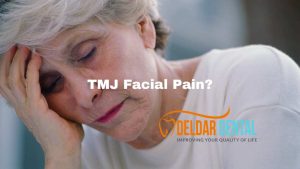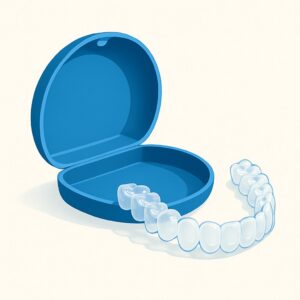Dr. Mike Deldar, TMJ Dentist in Noblesville:
“Temporomandibular Joint Disorder (TMJ) can be a perplexing and painful condition that affects many individuals, yet its origins are often shrouded in mystery. From injury to genetics, various factors can contribute to the development of TMJ disorder. In this comprehensive guide, we will delve into the 13 primary causes of TMJ disorder, shedding light on the factors that lead to its onset.”
1. Injury
One of the leading causes of TMJ disorder is physical injury. Trauma to the jaw or head region, whether from accidents, falls, or sports injuries, can disrupt the delicate balance of the temporomandibular joint, causing pain and discomfort.
2. Tooth Decay
Untreated tooth decay can have far-reaching consequences, including TMJ disorder. Cavities and infections that reach the jaw can lead to inflammation and discomfort in the joint area.
3. Infection
Infections affecting the jaw area can trigger inflammation and pain in the temporomandibular joint. These infections can arise from sources such as dental abscesses or sinus infections.
4. Autoimmune Diseases
Certain autoimmune diseases, such as rheumatoid arthritis, can target the joints, including the temporomandibular joint. The resulting inflammation can contribute to TMJ disorder symptoms.
5. Arthritis
Arthritis, a common joint disorder, can also affect the temporomandibular joint. Osteoarthritis and other forms of arthritis can lead to joint degeneration and TMJ-related discomfort.
6. Stress
Stress is a modern-day epidemic, and it can take a toll on various aspects of our health, including our jaw health. Bruxism, or teeth grinding, often linked to stress, can strain the temporomandibular joint and lead to TMJ disorder.
7. Teeth Grinding
Teeth grinding, whether due to stress or other factors, can significantly contribute to the development of TMJ disorder. The constant pressure and motion can strain the joint and surrounding muscles.
8. Dental Procedures
Certain dental procedures, such as wisdom tooth extraction or orthodontic adjustments, can inadvertently impact the temporomandibular joint. This is particularly true if the procedures involve prolonged jaw opening or manipulation.
9. Medical Procedures (Surgery)
Non-dental medical procedures, like surgeries involving the head, neck, or jaw, can sometimes lead to TMJ disorder. The trauma from these procedures can disrupt the joint’s natural function.
10. Repetitive Action
Engaging in repetitive actions that involve the jaw, such as chewing gum excessively or biting nails, can strain the temporomandibular joint over time, potentially leading to TMJ disorder.
11. Bad Posture
Poor posture doesn’t just affect your back; it can also impact your jaw health. Incorrect posture can lead to misalignment of the temporomandibular joint and contribute to TMJ disorder.
12. Genetics
Genetics play a role in various health conditions, and TMJ disorder is no exception. If you have a family history of TMJ issues, you may be genetically predisposed to developing the disorder.
Comprehensive and compassionate TMJ Treatment in Noblesville (IN)
For those struggling with TMJ disorder, the path to relief starts with accurate diagnosis and effective treatment. Dr. Mike Deldar, a distinguished TMJ Dentist in Noblesville, has been at the forefront of providing comprehensive and compassionate care for TMJ patients. With a deep understanding of the complex factors contributing to TMJ disorder, Dr. Deldar offers personalized TMJ treatment plans that address the root causes of the condition.
Dr. Mike Deldar, TMJ Disorder Dentist in Noblesville:
“Temporomandibular Joint Disorder can be a debilitating condition that arises from a multitude of factors. From injuries to genetics, it’s crucial to recognize the various causes in order to understand and effectively manage the condition. With advancements in dental and medical care, individuals suffering from TMJ disorder can find solace in the fact that there are solutions available to alleviate their pain and restore their quality of life.”




